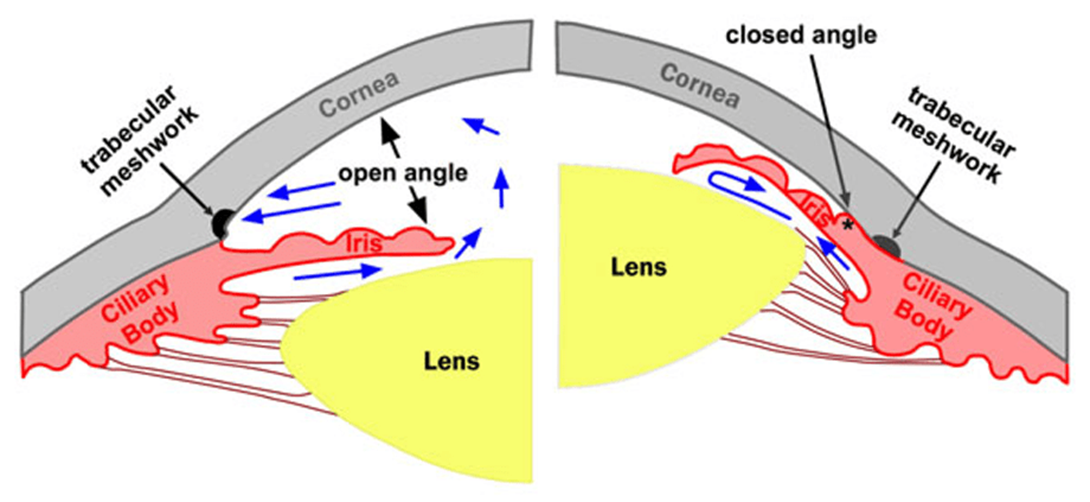A client is receiving miotics for the treatment of open-angle glaucoma. The nurse determines that a priority nursing problem is the risk for injury. This nursing problem is based on which etiology?
Decreased night vision.
Increased sensitivity to light.
Increased frequency of lacrimation.
Diminished color perception.
The Correct Answer is A
Choice A reason:
Decreased night vision is a significant concern for clients receiving miotics for open-angle glaucoma. Miotics, such as pilocarpine, work by constricting the pupil (miosis), which can reduce the amount of light entering the eye. This effect is particularly problematic in low-light conditions, leading to decreased night vision and increasing the risk of injury due to poor visibility
Choice B reason:
Increased sensitivity to light, also known as photophobia, can occur with the use of miotics, but it is not the primary concern related to the risk of injury. While photophobia can cause discomfort and avoidance of bright environments, it does not directly contribute to the risk of injury as significantly as decreased night vision.
Choice C reason:
Increased frequency of lacrimation (tearing) can be a side effect of miotics, but it is not a major factor in the risk of injury. Excessive tearing can cause discomfort and blurred vision temporarily, but it does not pose a significant risk for injury compared to decreased night vision.
Choice D reason:
Diminished color perception is not a common side effect of miotics. Miotics primarily affect the pupil size and accommodation, rather than color vision. Therefore, this choice is not relevant to the risk of injury associated with the use of miotics.

Nursing Test Bank
Naxlex Comprehensive Predictor Exams
Related Questions
Correct Answer is B
Explanation
Choice A reason: Insulin glargine is a long-acting insulin used to manage blood glucose levels in patients with diabetes. It is not typically used for the acute management of severe hypoglycemia. Instead, fast-acting glucose sources or glucagon injections are recommended for severe hypoglycemia. Therefore, teaching the family how to inject insulin glargine for severe hypoglycemia is not appropriate.
Choice B reason: Teaching the client self-injection skills for daily subcutaneous administration is crucial. Insulin glargine is administered once daily to provide a steady level of insulin throughout the day and night. Proper self-injection technique ensures that the medication is delivered correctly and effectively, which is essential for managing blood glucose levels in type 2 diabetes.
Choice C reason: While it is important for patients to monitor their blood sugar levels, insulin glargine dosing is typically fixed and not adjusted based on before-meal blood sugar readings. Instead, adjustments to the dose are made based on overall blood glucose trends and A1C levels, under the guidance of a healthcare provider.
Choice D reason: Increasing the dosage of insulin glargine in response to ketoacidosis is not appropriate. Diabetic ketoacidosis (DKA) is a medical emergency that requires immediate treatment with rapid-acting insulin, fluids, and electrolytes. Patients should be instructed to seek emergency medical care if they experience symptoms of DKA.
Correct Answer is B
Explanation
Choice A reason: Taking tamsulosin early in the day is not necessary. Tamsulosin should be taken approximately 30 minutes after the same meal each day to ensure consistent absorption and effectiveness1. The timing of the dose is less critical than ensuring it is taken after the same meal daily.
Choice B reason: Tamsulosin can cause orthostatic hypotension, which is a sudden drop in blood pressure when standing up from a sitting or lying position. This can lead to dizziness or fainting. Therefore, it is crucial to instruct patients to stand and sit up slowly to prevent falls and injuries.
Choice C reason: Reducing daily fluid intake is not recommended for patients taking tamsulosin. Adequate hydration is important for overall health and can help manage urinary symptoms associated with BPH. There is no evidence suggesting that fluid restriction improves the effectiveness of tamsulosin.
Choice D reason: Tamsulosin should be taken daily, not on a twice-a-week dosing schedule. Consistent daily dosing is necessary to maintain stable blood levels of the medication and ensure its effectiveness in managing urinary retention due to BPH.
Whether you are a student looking to ace your exams or a practicing nurse seeking to enhance your expertise , our nursing education contents will empower you with the confidence and competence to make a difference in the lives of patients and become a respected leader in the healthcare field.
Visit Naxlex, invest in your future and unlock endless possibilities with our unparalleled nursing education contents today
Report Wrong Answer on the Current Question
Do you disagree with the answer? If yes, what is your expected answer? Explain.
Kindly be descriptive with the issue you are facing.
